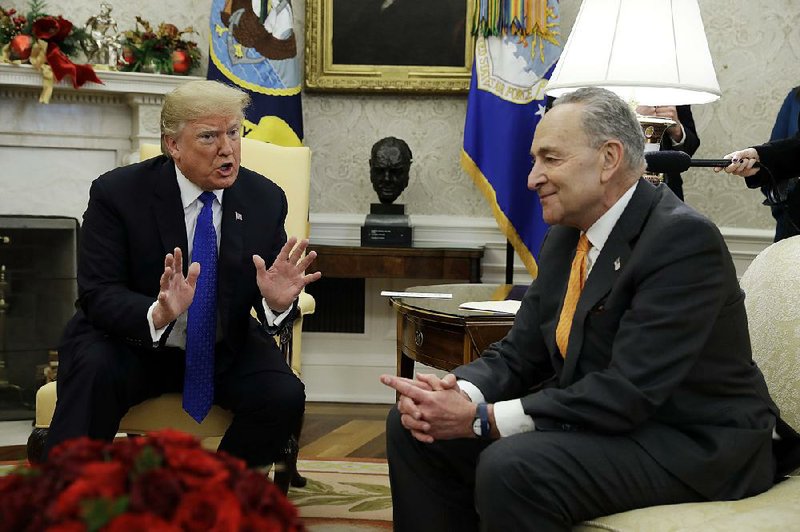WASHINGTON -- The White House on Sunday reiterated its threat to push the federal government into a partial shutdown this week, digging in on its demand for $5 billion to build a border wall as congressional Democrats stood firm against it.
"We will do whatever is necessary to build the border wall to stop this ongoing crisis of illegal immigration," said White House senior adviser Stephen Miller on CBS' Face the Nation.
Asked if that meant having a government shutdown, he said: "If it comes to it, absolutely."
"This is a very fundamental issue," Miller said. "At stake is the question of whether or not the U.S. remains a sovereign country, whether or not we can establish and enforce rules for entrance into our country."
From the Democratic side came admonitions that the White House and congressional Republicans would bear responsibility if a shutdown disrupts government agencies during the year-end holiday season. Senate Minority Leader Charles Schumer, D-N.Y., called on Republican leaders to stand up to Trump's demands for funding for the wall.
"We should not let a temper tantrum, threats, push us in the direction of doing something that everybody -- even our Republican colleagues -- know is wrong," Schumer said on NBC's Meet the Press.
The idea of a wall is deeply unpopular among Democratic voters, and party leaders have little incentive to bail Republicans out of a politically difficult situation.
Republican leaders in both the House and Senate have tried to avoid a shutdown.
Trump said last week that he would be "proud" to have a shutdown to get Congress to approve a $5 billion down payment to fulfill his campaign promise to build a wall on the U.S.-Mexico border. But the president doesn't have the votes from the Republican-controlled Congress to support funding for the wall at that level.
Democratic congressional leaders, Schumer and Rep. Nancy Pelosi of California, have proposed no more than $1.6 billion, as outlined in a bipartisan Senate bill. The money would not go for the wall but for fencing upgrades and other border security. Democrats also offered to simply keep funding at its current level, $1.3 billion.
Sen. Richard Durbin of Illinois, the No. 2 Senate Democrat, said on ABC's This Week that whether the shutdown happens rides on Trump taking one of those offers, and that he's not optimistic.
"It's up to the president to accept this," Durbin said. "I don't think he will but, for the good of the country, I hope he does."
Both parties in Congress have suggested that Trump would likely need to make the next move to resolve the impasse. The House is taking an extended weekend break, returning Wednesday night. The Senate returns today after a three-day absence.
Trump had neither accepted nor rejected the Democrats' proposal as of Friday, according to the Democrats, telling them he would take a look. Trump will need Democratic votes either way, now or in the new year, for passage.
Congress already has passed legislation to cover about three-quarters of federal government spending that requires annual approval. Agencies that have been funded through September include the departments of Defense, Veterans Affairs, and Health and Human Services. In addition, some of the government's biggest spending programs, including Social Security, Medicare and Medicaid, do not require annual appropriations and would not be affected by a shutdown.
Still, a partial shutdown could be widely felt. About one-quarter of the government would be affected, including the departments of Homeland Security, Transportation, Agriculture, State and Justice.
The administration has not released detailed plans for a shutdown, but a wide range of government operations and services could close temporarily or be restricted, including national parks, passport and visa offices, small-business loans and public health services.
About one-third of the federal government's 2.1 million civilian employees would not be paid during a shutdown, although many would be expected to show up for work without pay. In past shutdowns, workers were paid afterward, but that's not guaranteed.
Rep. Elijah Cummings, D-Md., incoming chairman of the House Oversight Committee, said on CNN's State of the Union that he hoped Trump would reconsider, citing the hardship to thousands of federal workers who would risk either their salaries being deferred or being furloughed without pay.
"Whenever I hear a president say to the American people at Christmastime, 'I am going to shut down your government,' it pains me, because I know that that's going to make a bad Christmas for a lot of people," Cummings said. "They don't want government to hurt them. They want government to help them."
Wyoming Sen. John Barrasso, the No. 3 Republican in the Senate, said Republicans remain hopeful they can come up with a proposal that can be acceptable to Trump and pass both chambers. He suggested that could take the form of a stopgap bill that extends funding until January, or a longer-term bill that includes money for border security.
"There are a lot of things you need to do with border security," he said on Face the Nation. "One is a physical barrier but also the technology, the manpower, the enforcement, all of those things, and our current laws are in some ways an incentive for people to come to this country illegally, and they go through great risk and possibly great harm."
Sen. Susan Collins, R-Maine, urged senators to revisit a bill she helped push earlier this year that would provide $2.5 billion for border security, including physical barriers as well as technology and border patrol agents.
"There's absolutely no excuse to shut down government on this issue or any other issue," Collins said on This Week.
Schumer declined to say whether Democrats would be willing to consider proposals other than the two options that he and Pelosi offered.
Republicans "should join us in one of these two proposals, which would get more than enough votes passed and avoid a shutdown," Schumer said. "Then, if the president wants to debate the wall next year, he can. I don't think he'll get it. But he shouldn't use innocent workers as hostages for his temper tantrum."
Information for this article was contributed by Hope Yen of The Associated Press; by Mark Niquette and Jesse Hamilton of Bloomberg News; and by Laura King of the Los Angeles Times.
A Section on 12/17/2018


